- Home
- Alex Archer
Seeker’s Curse Page 11
Seeker’s Curse Read online
Page 11
It was what every rapist-brigand of a terrorist and every political officer would say. That Jagannatha meant it made little difference.
“I only want information on the foreigners,” he said.
The old man looked him in the eye for a moment. He had, Jagannatha knew, never been a soldier. One of the things bitter experience had taught the major was not to look down on these tough mountain peasants on that account. The man may not have fighting skills. But he knew how to endure.
You are just another mountain storm, the farmer’s look said. You and your kind. You may smite us as with lightning, or wash us away with a sudden flood. But if we survive, we shall remain and you shall go. If we do not survive our people will remain, as we have for ages. Whereas those like you come and go.
Jagannatha wished he could refute the wisdom in that look.
“We will not give you information that might bring harm to our kin,” the father said with finality. Then he sat back and glanced at his wife, who sat with her head bowed, tightly gripping her apron in fear. “Do with us what you will.”
Jagannatha rose. “Then I will leave you. I admire your courage, comrade. And your loyalty. Just look deep in your heart and make sure it is not misplaced.”
The farmer did not meet his gaze now. It wasn’t from fear, Jagannatha knew, but contempt. The peasant would see loyalty directed toward anything but his family and blood first as misplaced. That was the curse of this tribal land.
Yet it was also its strength.
With a grunt and peremptory head shake Jagannatha ordered his two men out into the rapidly deepening mountain dusk. He stared at the farmer until the man looked at him. He nodded once. Then he followed his men from the hut.
His patrol of twenty men, each armed with an assault rifle, had gone barely a quarter of a mile through the farmer’s terraced fields when the sounds of a scuffle came from nearby. Guns came up and safeties switched off—showing just how disciplined Jagannatha’s men were despite their ragged demeanor.
The major raised a hand. His men gripped their weapons in tense readiness. No one spoke.
A steep, pebbly ridge ran past them to the right, descending to meet the narrow valley they walked along. In a moment Jagannatha heard crunching and saw one of his scouts with his kukri pressed to the skinny neck of the older son of the family they had just left. From the narrow ridge’s top the scout gave the boy a shove. He rolled down and landed just in front of the major’s boots.
Rifles swung to cover the boy. Jagannatha waved them off.
“Why are you sneaking after us, boy? Are you spying on us?”
“No!” The boy scrambled to his feet. Jagannatha hooked his thumbs through the web belt he wore and rocked back on the heels of his British Army-issue boots. “I want to help you.”
“What kind of help can you give us?”
The youth looked around nervously. It seemed he was more afraid one of his kinfolk had followed him and might see what he was about than he was of the heavily armed pack surrounding him. “I can give you information,” he said.
A jay stridently abused the guerrillas for their trespass from a scrubby, spiky bush.
“You will give up your kinsfolk, then?” Jagannatha asked.
The youth licked his lips. He wore a Western-style jacket, T-shirt and jeans. “You won’t hurt my relatives?”
Jagannatha shook his head. “I can’t promise that. If you know my reputation you know I don’t kill unless I have to. I shall try not to harm your cousins. If they fight me, though, they take their chances.”
The kid squinched his face up in an agony of indecision. Jagannatha stood looking at him unsympathetically.
The youth gave his head a spastic shake. “I don’t know much. Only this one thing—a foreign man has joined them. He is tall, clean shaved, dark. He has the look of an eagle. Or so they say.”
After a moment, Jagannatha nodded. “That is a good thing to know.”
He turned to walk on. The sun had vanished. The rising wind blew cold. Clouds streaked across the sky were turning orange and violet.
The boy reached out and grabbed the major’s sleeve. With an alacrity astonishing in a bandy-legged, middle-aged man with something of a paunch, Jagannatha spun and backhanded him to the ground.
To his credit the young man didn’t waste time on foolish questions—such as why the major had struck him—nor whining complaints. Instead he pushed up to a sitting position and said, “Let me join you.”
“No,” Jagannatha said. “Go to school. Learn the skills to make your family and your people strong.”
He started to walk on again. The youth leaped to his feet. “You can’t just blow me off like this, no matter who you are!” he shouted. “I helped you. You can’t just leave me here!”
He tried to run after Jagannatha. The guerrillas thrust him rudely back. One raised a gun to smash the youthful face with the heavy steel-shod butt.
“Enough!” Jagannatha roared, spinning around again. “The child blusters to cover his disappointment. For this you would break his head? Show off your manhood when government bullets crack so low over your heads their passage stings your face like wind-blown ice crystals. Not by offering to descend in a pack and tear apart some foolish pup who yaps and shows his teeth to cover his own embarrassment at being rejected. That impresses no one.”
His men hung their heads and fell back. The young man looked little comforted at being left suddenly alone beneath the glowering scrutiny of the major.
“As for you,” Jagannatha said softly, “be grateful you asked me, and not some other who would be only too eager to enlist your flesh—to shield his own from enemy bullets.”
The youth looked blank. “But I want to fight the corrupt government!”
“Do you?” Jagannatha smiled. The young man’s face lost whatever color it retained. “Bored with farm life, are you? Then go and join the army.”
“What? But you’re rebels! I don’t understand.”
Technically the guerrillas weren’t rebels at all, but an armed formation belonging to a party that legally held a major share of power in Nepal. Jagannatha didn’t feel like mincing such legalisms with this callow child out here on a windy hillside.
“Learn something. Get training. Get tough. Learn what it means to be a soldier. Get some discipline. Get some real training. If you can, go and fight.”
The boy shook his head. “I don’t understand,” he said again. “If I’m to fight the government, how can I join its army?”
“How better? Half of us were government soldiers once. Let your enemy train you and arm you. Then some night, when you are ready—when you know something worth knowing, including who you are and what you really want—then take your weapon and your pack and slip away to join the revolution. Then you will have something valuable to bring us.”
The kid shook his head uncomprehendingly. His mouth hung open.
“It’s an old trick,” Jagannatha said. “But it’s being used right now in Iraq and in Afghanistan, and a dozen other countries. The forces of repression are training and equipping those who will defeat them in the end.”
With an air of finality he turned away. His men took their weapons off the youth. The section moved off down the slope, seeming to dissolve into the heavy mauve twilight.
The boy stood and watched them go. Then he turned and scrambled clumsily back toward the comforting yellow glow of his family’s hut.
16
The next day the members of the expedition found their first lost treasure shrine.
They were working in a saddle of scrubland between densely forested hills. Snow clumped on the north sides of rocks, hollows and bushes. An outcrop of rock seemed to have crumbled and slumped at the foot of a large boulder.
With nerve-straining care, Annja eased a basketball-size stone out of place. Then she held her breath. She was afraid the whole apparently random rockfall would come sliding down on top of her.
The rocks stayed put.
; She raised her flashlight and shone it into the hole exposed by the rock she had removed. A golden fat man beamed back at her from the lotus position.
“Bingo,” she said, easing back. She got her camera and took some shots.
The Sherpas all sat on their packs smoking. They talked in quiet voices among themselves. A couple of new ones had joined them from a village in brushy country above the Lamasery of the Woods. One served solely as a local guide.
The notion of sitting and watching while their employers worked seemed to afford them endless amusement. Prasad and his nephew kept watch.
Showing the same well-schooled patience and discipline she’d expect from a grad student, Pan helped her ease other rocks away from the opening of stones cleverly constructed to appear natural.
The shrine was small. Some long-cold joss sticks sat in little porcelain containers flanking the Buddha. A litter of dried flower petals, white and pink, covered offerings in the form of crumpled, faded bills. Beneath them, when Annja shifted them aside, lay gold coins.
Painstakingly they transferred the treasures out to a blue plastic ground cover, photographed them, noted them and examined them one by one. The local porters seemed to grow somewhat tense during this proceeding. Prasad and Lal spoke encouragingly to them. They continued to watch the foreigners like hungry falcons.
To her disappointment none of the coins was particularly old. As far as she could tell from Prasad’s reading of inscriptions blurred by the handling of countless fingers, the oldest dated back to about the mid-eighteenth century. They were not even back to her primary period of interest and far from the distant Macedonian occupation. Still, it was definitely the sort of thing she’d been hired to find—originally.
Am I getting tunnel vision? she wondered. Have I become so fixated on the Highest Shrine I’m overlooking sites of lesser value? It was possible, she had to acknowledge to herself. She didn’t think she was feeling the lure of gold per se. She had no expectation of being allowed to keep any treasure she came across, nor any intention to do so.
“You know,” Pan said, holding a note up to the sun in fingers clad in fine cloth gloves, “I get the feeling this shrine isn’t ‘lost’ at all. Some of these banknotes are quite recent.”
“You think it’s just hidden, then,” Annja said. “Maybe to keep tourists and bandits from cleaning it out?”
“That’d be my guess,” he said, placing the note back down on the plastic sheet as carefully as if it were a thousand years old. Annja approved. Good practice was good practice. A good field worker never handled any artifact casually, much less carelessly.
They recorded the coordinates on Annja’s GPS. Then they carefully replaced everything in the shrine—using the camera to document that, too—in the reverse order they had taken it out. Carefully, they rebuilt and resealed the happenstance-looking cairn in a way that concealed it from profane eyes.
When everything was duly recorded in images and cataloged in Annja’s computer, they backed it all up to handy thumb drives. To Annja they were a great boon to fieldwork. She had already encountered grad students who didn’t remember doing archaeology before the advent of the USB flash drive. They made Annja feel old.
Finishing, they stood and looked around. The local men had visibly relaxed. They nodded to the two foreigners and then paid them no further attention, chatting among themselves in a local dialect. Prasad and Lal openly grinned at their employer.
“It might just be me,” Pan said, “but your friends from Baglung have the air about them of men who’ve just won a bet.”
THE BURST OF METAL-JACKETED bullets kicked up puffs of dust and grit four feet in front of Annja.
She threw herself behind a big granite rock to the left of the path. Fortunately they weren’t traversing a long open slope with a sheer drop to one side—at the moment. Instead they were in close country, where hills sparsely tufted with brush and winter-brown bunch grass pitched sharply up and down all around them.
She looked around. The rest of her party had gone to ground like prairie dogs at the distinctive thudding of a Kalashnikov. The Sherpas weren’t ex-Gurkhas or army vets like Prasad and Lal. But they had either experience of taking cover from gunfire or just a natural aptitude.
Across the path Pan crouched behind a clump of rocks with a wind-gnarled cedar sprouting from its top. He had his pack grounded at his side and his sidearm in his right hand. It was a full-sized Glock, either a 9 mm or a .40 caliber; she couldn’t tell at this range. With his left hand he was digging behind his back under his jacket.
His came up with an abbreviated version of the piece he held in his right hand—black, with the unmistakable boxy Glock outlines. He tossed it to Annja.
“Keep it,” he called. “I’ve been meaning to give it to you.”
She caught it by reflex. “Anybody hit?” she called out behind her.
“No,” Lal called back. Another burst of gunfire snarled from somewhere behind and to Annja’s right. These reports were higher pitched. Annja guessed they came from an American-made M-16.
Fearing that she might still be exposed to hidden ambushers, Annja took stock of their surroundings. A mountain brook glittered and tinkled down the slope to her left. Ahead of the expedition a big brow of granite rose maybe four stories high, with bits of brush sprouting from it, and more wind-twisted cedars crowning it. The stream wound past its base. That was almost certainly where the first shots had come from. Even as she looked she saw smoke puff from the gray rock brow as another burst echoed through the valley.
Another higher-pitched snarl ripped from behind her. A despairing cry answered it. Annja’s heart slammed as she turned her head quickly to see another bluish wisp of smoke whipped away from the rocky top of the ridge paralleling their line of march.
Their ambushers had caught them in a classic fire sack. But she could see at once they had chosen in-expertly. The ground around her party was too irregular, with too many folds providing dead ground out of the attackers’ field of fire, too many clumps of scrub and mounded boulders. The defenders had plenty of cover available, as well as concealment, from every angle.
What they lacked was an easy way out. Annja knew the classic technique for dealing with an ambush was to assault right into it. Fast and hard. Probably the attackers knew it, too; certainly if they were in fact Jagannatha’s men. Prasad and Lal had him down as a man who knew his craft, and they knew theirs well enough to tell.
To attack straight up that rock cliff with any speed Annja figured you’d have to be Spider-Man, or at least a champion rock climber. And even to get to the base you’d have to cross open ground with men shooting automatic weapons at you.
A big-bore handgun cracked to Annja’s right. She kept her eyes on the cliff, saw dust puff away from the rock near where the last burst had originated. She doubted Pan had hit anyone. But at fifty yards it was a hell of a shot from a handgun fired at an upward angle. It would at least keep the shooters up there from getting too cocky.
The problem was the enemy held the heights. That meant they could shift position unseen by their targets, in perfect safety. While the expedition members could readily find cover against observation or fire from almost any angle, they couldn’t be shielded from every direction simultaneously. All the bad guys had to do was keep firing off enough rounds to keep their heads down while their buddies scouted for better shots. And when they had those lined up…
Annja checked her Glock’s chamber. Then she got up and rabbited up the slope to the right.
Pan shouted something as she flashed past him. She ran bolt upright, hair streaming behind her, trusting speed rather than hunkering down or dodging to get to the temporary shelter she sought. Automatic weapons, several at once in different timbres, roared angrily at her, filling the valley with shuddering thunder. Behind her Annja heard the harder, measured whack of Lal squeezing off aimed shots from his Enfield. Pan, shouting wordlessly, emptied a double-stack magazine at the granite bluff, desperately trying to force
the ambushers’ heads down.
Annja’s goal was a narrow, dry channel that ran down the slope to their right. It was floored with a lot of loose rock, treacherous footing. But if she judged properly she’d be protected from fire from both directions once she reached it.
Bullets struck off a rock in front of her. A ricochet moaned past her ear. She launched herself forward in a dive, remembering to hold her Glock up with her finger outside the trigger guard as she landed on her bent arms in the scree.
She slid, scraping her hands and banging her elbows cruelly. As she crunched to a stop she heard a scream. She raised her head far enough to see the granite cliff. A rifle fell, sling flapping. The figure of a man followed flailing. He fell headfirst into the rock at the foot of the cliff. His drawn-out cry died with him.
“Whoa,” Annja breathed. Evidently an incautious ambusher, overcome by buck fever and trying furiously to track the sprinting woman in his battle sights, had risen out of cover. Either Pan or, more likely, Lal had nailed him and he’d toppled forward into the air.
A sudden attack of common sense made her flatten herself as a single shot fired from ahead and above cracked over her head and hit a flat rock a yard away. It didn’t much surprise her that nobody had hit her on her desperate dash. Nor that the opening burst of the engagement hadn’t hit anybody. The truth was nobody could hit anything full-auto at any distance except by accident or sheer volume of firepower.
The ambushers had made mistakes but were smart enough to figure that out. An assault rifle, especially a Kalashnikov, wasn’t ideal for aimed fire. But if you had the self-discipline to aim and fire single shots, the range was actually pretty short.
Annja crawled fifteen feet up the dry wash. The rocks gouged at her. Fortunately she wore long sleeves rolled down and long pants, or she’d be scraped seriously. As it was, she was going to look as if she’d been dragged through the proverbial knothole backward.
If she lived long enough. That was key. Living until you could care how you looked.

 Rogue Angel: Forbidden City
Rogue Angel: Forbidden City The Spider Stone
The Spider Stone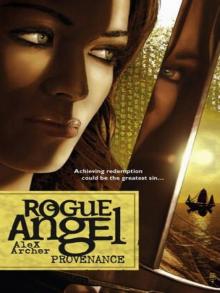 Provenance
Provenance Blood Cursed
Blood Cursed Fury's Goddess
Fury's Goddess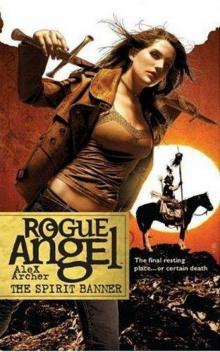 The Spirit Banner
The Spirit Banner Footprints
Footprints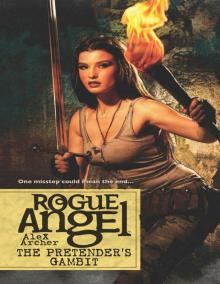 The Pretender's Gambit
The Pretender's Gambit Rogue Angel: The Lost Scrolls
Rogue Angel: The Lost Scrolls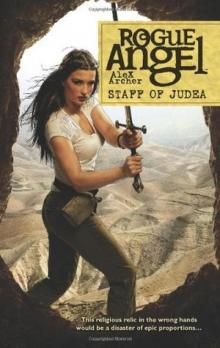 Staff of Judea
Staff of Judea Rogue Angel 55: Beneath Still Waters
Rogue Angel 55: Beneath Still Waters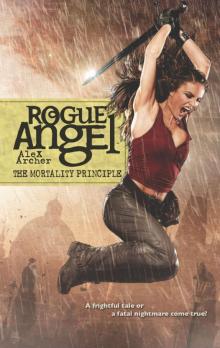 The Mortality Principle
The Mortality Principle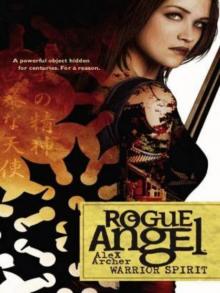 Warrior Spirit
Warrior Spirit Paradox
Paradox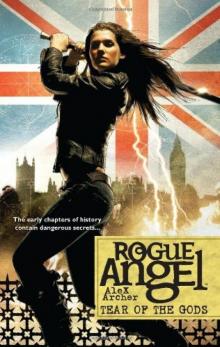 Tear of the Gods
Tear of the Gods Forbidden City
Forbidden City River of Nightmares (Rogue Angel)
River of Nightmares (Rogue Angel) Rogue Angel: The Secret of the Slaves
Rogue Angel: The Secret of the Slaves Destiny
Destiny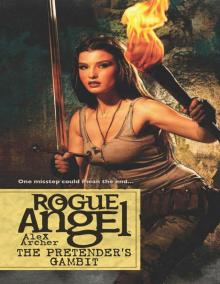 Rogue Angel 51: The Pretender's Gambit
Rogue Angel 51: The Pretender's Gambit Celtic Fire
Celtic Fire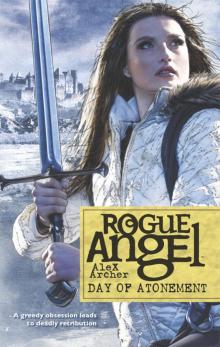 Rogue Angel 54: Day of Atonement
Rogue Angel 54: Day of Atonement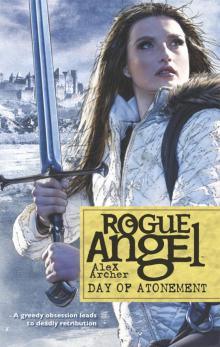 Day of Atonement
Day of Atonement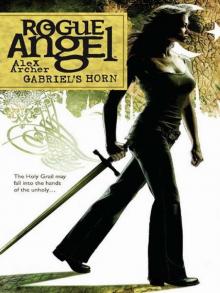 Rogue Angel: Gabriel's Horn
Rogue Angel: Gabriel's Horn Grendel's Curse
Grendel's Curse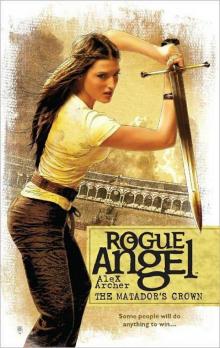 The Matador's Crown
The Matador's Crown Rogue Angel: The Chosen
Rogue Angel: The Chosen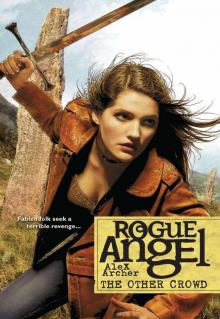 The Other Crowd
The Other Crowd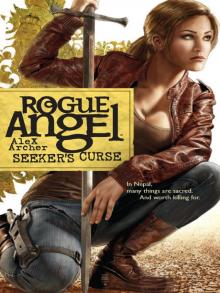 Seeker’s Curse
Seeker’s Curse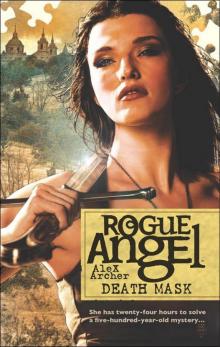 Rogue Angel 52: Death Mask
Rogue Angel 52: Death Mask The Golden Elephant
The Golden Elephant Blood Cursed (Rogue Angel)
Blood Cursed (Rogue Angel) Celtic Fire (Rogue Angel)
Celtic Fire (Rogue Angel)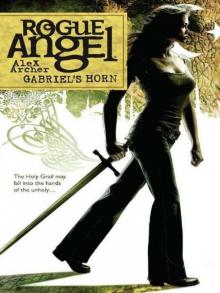 Gabriel's Horn
Gabriel's Horn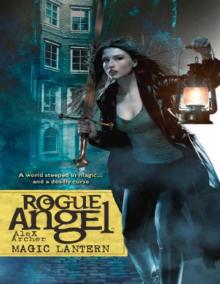 Magic Lantern (Rogue Angel)
Magic Lantern (Rogue Angel) God of Thunder
God of Thunder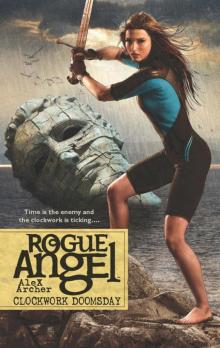 Clockwork Doomsday
Clockwork Doomsday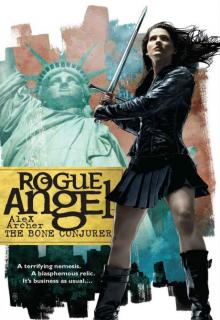 The Bone Conjurer
The Bone Conjurer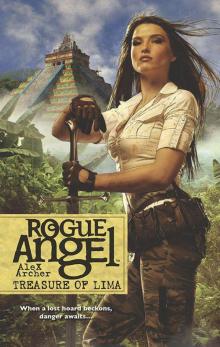 Treasure of Lima
Treasure of Lima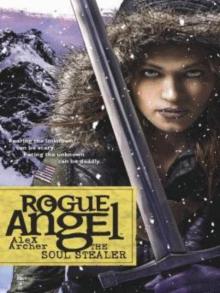 The Soul Stealer
The Soul Stealer The Dragon’s Mark
The Dragon’s Mark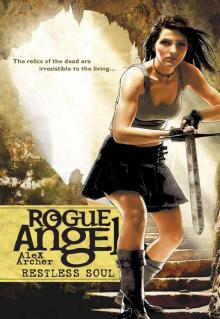 Restless Soul
Restless Soul Rogue Angel: God Of Thunder
Rogue Angel: God Of Thunder Rogue Angel 49: The Devil's Chord
Rogue Angel 49: The Devil's Chord Death Mask
Death Mask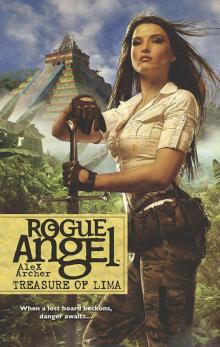 Rogue Angel 46: Treasure of Lima
Rogue Angel 46: Treasure of Lima Swordsman's Legacy
Swordsman's Legacy The Oracle's Message
The Oracle's Message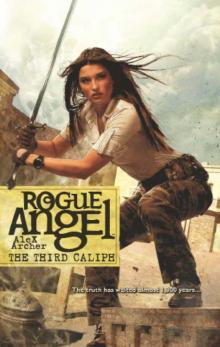 The Third Caliph
The Third Caliph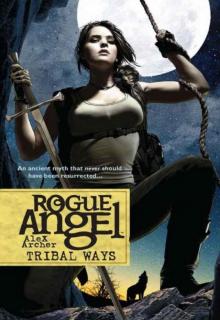 Tribal Ways
Tribal Ways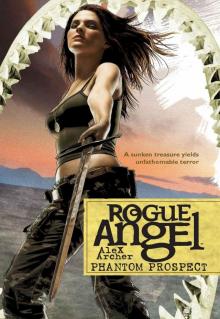 Phantom Prospect
Phantom Prospect Rogue Angel 50: Celtic Fire
Rogue Angel 50: Celtic Fire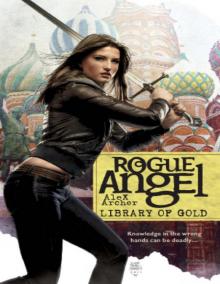 Library of Gold
Library of Gold Rogue Angel 53: Bathed in Blood
Rogue Angel 53: Bathed in Blood Sacred Ground
Sacred Ground The Devil's Chord
The Devil's Chord Serpent's Kiss
Serpent's Kiss The Vanishing Tribe
The Vanishing Tribe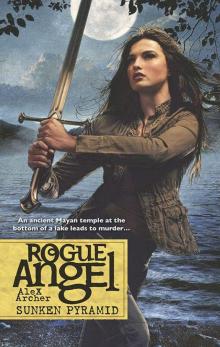 Sunken Pyramid
Sunken Pyramid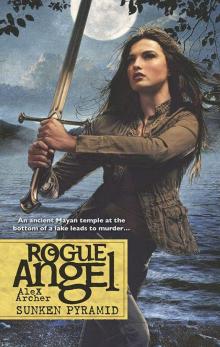 Sunken Pyramid (Rogue Angel)
Sunken Pyramid (Rogue Angel)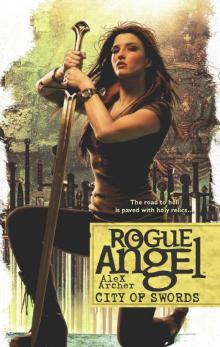 City of Swords
City of Swords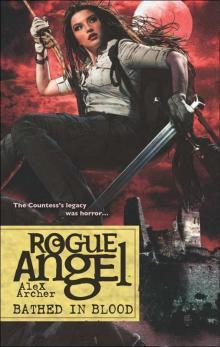 Bathed in Blood
Bathed in Blood The Lost Scrolls
The Lost Scrolls The Babel Codex
The Babel Codex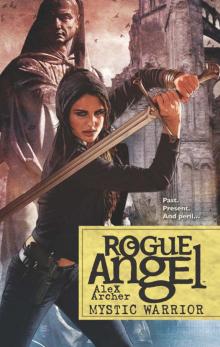 Mystic Warrior
Mystic Warrior Eternal Journey
Eternal Journey Beneath Still Waters
Beneath Still Waters Solomon's Jar
Solomon's Jar Beneath Still Waters (Rogue Angel Book 55)
Beneath Still Waters (Rogue Angel Book 55) Cradle of Solitude
Cradle of Solitude Secret of the Slaves
Secret of the Slaves River of Nightmares
River of Nightmares Polar Quest
Polar Quest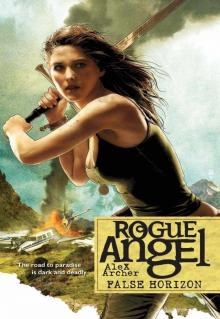 False Horizon
False Horizon